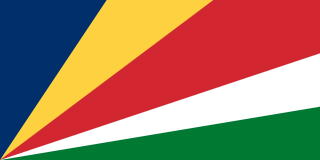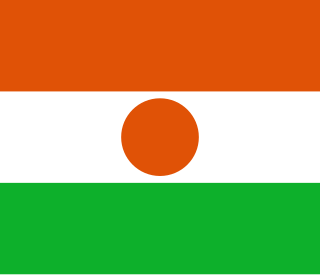
Nigeria competed at the 2004 Summer Olympics in Athens, Greece, from 13 to 29 August 2004. This was the nation's thirteenth appearance at the Olympics, except the 1976 Summer Olympics in Montreal, because of the African boycott. Nigerian Olympic Committee sent a total of 72 athletes, 24 men and 48 women, to the Games to compete in 10 sports. For the first time in its Olympic history, Nigeria was represented by more female than male athletes. Women's basketball and women's football were the only team-based sports in which Nigeria had its representation at these Games. There was only a single competitor in men's freestyle wrestling.

Ghana competed at the 2004 Summer Olympics in Athens, Greece from 13 to 29 August 2004.

Uganda competed at the 2004 Summer Olympics in Athens, Greece, from 13 to 29 August 2004. This was the nation's twelfth appearance at the Olympics, except the 1976 Summer Olympics in Montreal, because of the African boycott. The Ugandan Olympic Committee sent a total of eleven athletes to the Games, nine men and two women, to compete in four different sports. Half of these athletes had been participating in boxing, including Joseph Lubega, who later became the nation's flag bearer in the opening ceremony. There was only a single competitor in swimming and weightlifting.

Ghana competed in the 2008 Summer Olympics held in Beijing, People's Republic of China from August 8 to August 24, 2008.

Uzbekistan competed at the 2012 Summer Olympics in London, from July 27 to August 12, 2012. This was the nation's fifth consecutive appearance at the Olympics. The National Olympic Committee of the Republic of Uzbekistan sent the nation's smallest delegation to the Games in the post-Soviet era. A total of 54 athletes, 36 men and 18 women, competed in 13 sports. There was only a single competitor in fencing, rhythmic and trampoline gymnastics, shooting and tennis.

Bulgaria competed at the 2012 Summer Olympics in London, United Kingdom from 27 July to 12 August 2012. It was the nation's nineteenth appearance at the Summer Olympics, having missed the Olympics on three occasions, including the 1948 Summer Olympics in London due to the nation's role in World War II and 1984 Summer Olympics in Los Angeles because of the Soviet boycott. Despite this being London's third Olympic Games, this was the first time a Bulgarian team appeared at a London Olympics. The Bulgarian Olympic Committee sent the nation's smallest delegation to the Games, tying the record with Helsinki in 1952, and with Tokyo in 1964. A total of 63 athletes, 36 men and 27 women, competed in 16 sports. Men's volleyball was the only team event in which Bulgaria was represented in these Olympic games. There was only a single competitor in badminton, sprint canoeing, fencing, and judo.

Algeria competed at the 2012 Summer Olympics in London, United Kingdom, from 27 July to 12 August 2012. This was the nation's twelfth consecutive appearance at the Summer Olympics, except for the 1976 Summer Olympics in Montreal because of the African boycott.

Kenya competed at the 2012 Summer Olympics in London, from 27 July to 12 August 2012. This was the nation's thirteenth appearance at the Olympics, they did not participate in the 1976 Summer Olympics in Montreal and the 1980 Summer Olympics in Moscow because of the African and United States boycott.

Tanzania competed at the 2012 Summer Olympics in London, United Kingdom from 27 July to 12 August 2012. This was the nation's twelfth appearance at the Olympics. Tanzania did not compete at the 1976 Summer Olympics in Montreal, because of the African boycott.

Nigeria competed at the 2012 Summer Olympics in London, from 27 July to 12 August 2012. This was the nation's fifteenth appearance at the Olympics. Nigeria missed the 1976 Summer Olympics in Montreal because of the African boycott. The Nigerian Olympic Committee sent the nation's smallest delegation to the Games since 1984. A total of 53 athletes, 30 men and 23 women, competed in 8 sports. Men's basketball was the only team-based sport in which Nigeria was represented at these Olympic Games. Among the eight sports played by the athletes, Nigeria marked its official Olympic debut in slalom canoeing.

Gabon competed at the 2012 Summer Olympics in London, from 27 July to 12 August 2012. This was the nation's ninth appearance at the Olympics; the nation did not participate at the 1976 Summer Olympics in Montreal and 1980 Summer Olympics in Moscow, affected by the African and the American-led boycott, respectively.

Benin competed at the 2012 Summer Olympics in London, United Kingdom from 27 July to 12 August 2012. This was the nation's tenth appearance at the Olympics, except the 1976 Summer Olympics in Montreal because of the African boycott.

Lesotho competed at the 2016 Summer Olympics in Rio de Janeiro, Brazil, from 5 to 21 August 2016. This was the nation's eleventh appearance at the Summer Olympics, except the 1976 Summer Olympics in Montreal, because of its partial support to the African boycott.

Uganda competed at the 2016 Summer Olympics in Rio de Janeiro, Brazil, from 5 to 21 August 2016. Since the nation's official debut in 1956, Ugandan athletes have appeared in every edition of the Summer Olympic Games, with the exception of the 1976 Summer Olympics in Montreal because of its partial support of the African boycott.

Congo, officially Republic of the Congo, competed at the 2016 Summer Olympics in Rio de Janeiro, from August 5 to 21, 2016. This was the nation's twelfth appearance at the Summer Olympics, since its debut in 1964. Congolese athletes did not attend the 1968 Summer Olympics in Mexico City, and the 1976 Summer Olympics in Montreal because of the African boycott.
John Ampomah is a Ghanaian athlete specialising in the javelin throw. He is currently attending Middle Tennessee State University and is part of the university's track and field team.

Seychelles competed at the 2016 Summer Olympics in Rio de Janeiro, Brazil, from 5 to 21 August 2016. This was the nation's eighth appearance at the Summer Olympics, with the exception of the 1988 Summer Olympics in Seoul because of its partial support to the North Korean boycott.

Ghana competed at the 2016 Summer Olympics in Rio de Janeiro, Brazil, from 5 to 21 August 2016. This was the nation's fourteenth appearance at the Summer Olympics, having taken part in all but three editions since its debut at the 1952 Summer Olympics. Ghana did not attend the 1976 Olympics because of the African boycott and did not attend the 1980 Olympics because of the United States boycott.

Niger competed at the 2016 Summer Olympics in Rio de Janeiro, Brazil, from 5 to 21 August 2016. Since the nation made its debut in 1964, Nigerien athletes had participated in every edition of the Summer Olympic Games, except for two rare occasions, the 1976 Summer Olympics in Montreal, and the 1980 Summer Olympics in Moscow because of the African and the US-led boycotts, respectively.

Ghana competed at the 2020 Summer Olympics in Tokyo. Originally scheduled to take place from 24 July to 9 August 2020, the Games were postponed to 23 July to 8 August 2021, because of the COVID-19 pandemic. It was the nation's fifteenth appearance at the Summer Olympics, having taken part in all but three editions since its debut in 1952. Ghana did not attend Montreal 1976 because of the African boycott, as well as the Moscow 1980, when the nation joined the United States-led boycott.















